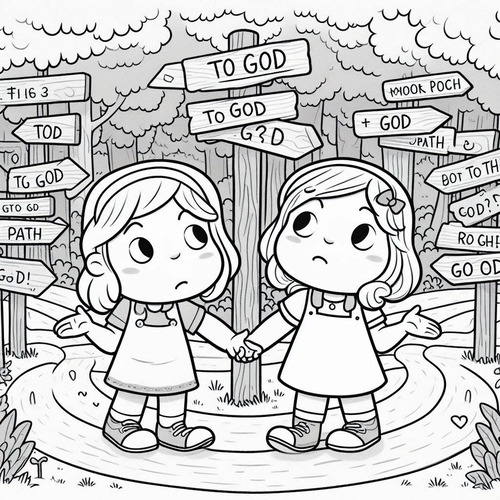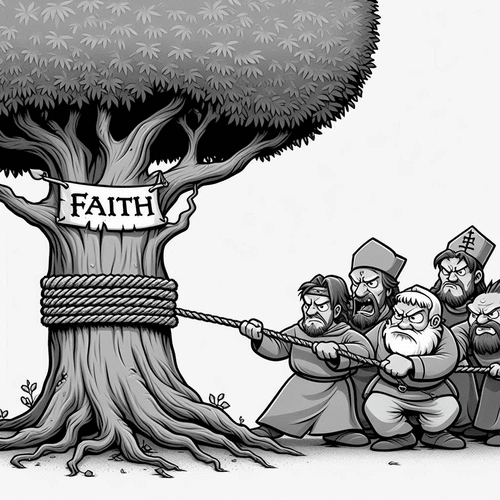A Critique of Christianity: Perspectives from Other Faiths
For over two centuries now, major world religions, philosophical traditions, and secular worldviews have raised serious objections to core Christian beliefs and tenets. From the Islamic world to Eastern faiths, Enlightenment rationality to modern atheism—Christianity has faced criticisms and countering viewpoints that appear to fundamentally contradict or call into question its theology and doctrinal stances.
However, Christian apologists and theologians have robust, adequate defences to each of these objections. Over the coming weeks, we shall examine the most substantial objections raised against Christianity one by one, and see how we may, with intellectual coherence and validity, and yet, with love and respect, uphold our faith’s traditions. Join us as we explore a critique of Christianity by other faiths, and consider how we might respond to each objection:
A Critique of Christianity on its ‘Polytheistic’ Undertones (Objection from Islam—Originated in 7th Century): From the viewpoint of Islam, a major contention against Christianity is its concept of the Trinity and the designation of Jesus as the Son of God. This theological stance has been seen by Muslims, since the advent of Islam in the 7th century, as a form of polytheism and a corruption of pure monotheistic doctrine. The Christian notion of Jesus’s divinity fundamentally contradicts Islam’s portrayal of Jesus as simply a powerful prophet and messenger of God. Some Muslims also argue the Bible has been corrupted and cannot be relied upon regarding tenets such as the Trinity and divinity of Christ.
Exclusivity of Salvation (Objection from Dharmic Faiths that Date Back to the Pre-Christian Era): Dharmic faiths like Hinduism and Buddhism, with traditions predating Christianity, take issue with Christianity’s exclusivist claims about being the sole path to salvation. The doctrine that only those who accept Jesus can attain heaven does not align with the pluralistic spiritual traditions of the East. Karmic religions have historically viewed this as an arrogantly narrow perspective incompatible with concepts like reincarnation and spiritual enlightenment.
Lack of Empirical Evidence (Objection from Atheists/Rationalists—Since the 18th Century): Atheists and secular humanist thinkers, notably since the 18th century Enlightenment, perceive Christianity as an outdated set of dogmatic beliefs lacking empirical evidence. They view the Bible as an historically compiled work of mythology and fiction rather than of divine truth. The rational, scientific worldview is contradicted by beliefs in supernatural miracles, creationism and biblical literalism.
Hindrance to Reason and Liberty (Objection from Enlightenment Philosophy—Since the 18th Century): Within the realm of philosophy, Enlightenment thinkers of the 18th century criticized Christianity’s perceived interference with human reason, rational inquiry and individual liberty. They saw the Church’s doctrinal authority and coercive enforcement as an impediment to social progress and freedom of thought.
A Critique of Christianity on its ‘Claims’ of Supremacy (Objection from Non-Christian Faiths—Historical): Generally speaking, non-Christian faiths across the world have viewed the core Christian beliefs surrounding the deification of Jesus, His miracles and resurrection, the concept of original sin, and humanity’s need for a divine Savior as misguided and fundamentally flawed theology not substantiated by evidence. The supremacy claimed by Christianity over all other belief systems is seen by ancient and modern faiths alike as an arrogant view incompatible with humanity’s global religious diversity.
Rejection of Jesus as Messiah (Objection from Judaism—Since 1st Century CE): While Christianity emerged from Jewish traditions and shares the Old Testament, Jews have seriously objected to Christian beliefs and theology from the very beginning in the 1st century CE. Fundamentally, Judaism rejects the Christian view of Jesus as the Messiah and Son of God. From the Jewish perspective, Jesus did not fulfil the messianic prophecies of the Old Testament and claiming his divinity is seen as idolatry that violates the Jewish concept of one true God.
Jews critique the Christian idea that the New Covenant superseded—in other words, replaced and made obsolete—the Old Covenant and Jewish religious law. Orthodox Jews argue that Christianity’s negation of codes like kosher dietary laws and requirements like circumcision undermine Jewish precepts laid out in the Torah (first five books of the Hebrew Bible).
Additionally, Jews contend there is no basis in medieval rabbinic literature from the formative years of Judaism for a Trinitarian theology. The whole notion of God comprising three distinct persons is viewed as an illegitimate, un-Jewish appropriation.
So while Christianity incorporates the Hebrew Bible, Jewish thinkers across centuries have repudiated Christian theology as a digression from Jewish monotheism, values and beliefs committed to writings like the Torah and Talmud. This Jewish opposition has represented a serious contention against Christian theology since its origins.
Conclusion: While some of these criticisms arise from differing metaphysical beliefs originating in pre-modern times, others underscore philosophical objections from more recent Enlightenment rationality. In the coming weeks, we shall engage with these varying perspectives across epochs allow Christianity to engage with dismissive viewpoints evaluating its orthodox traditions.
Related Reads
Editor's Pick

Why Do People Hate the Doctrine of Election?
…WHEN THEY REALLY SHOULDN’T Few Bible doctrines provoke stronger reactions than election. The idea that God chose some for salvation [...]

The Doctrine of Providence: Does God Really Govern All Things?
You’re sitting in the doctor’s office when the diagnosis lands like a thunderclap. Your mind races: Why this? Why now? [...]

No Decay, No Defeat: What It Means That Christ’s Body Saw No Corruption
On the Day of Pentecost, Peter stood before thousands and made a startling claim: David's body decayed in the tomb, [...]
SUPPORT US:
Feel the Holy Spirit's gentle nudge to partner with us?
Donate Online:
Account Name: TRUTHS TO DIE FOR FOUNDATION
Account Number: 10243565459
Bank IFSC: IDFB0043391
Bank Name: IDFC FIRST BANK






